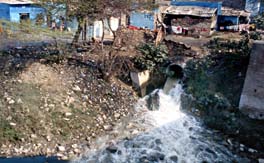Key Outcomes
/sub-categories/research-papers
/sub-categories/research-papers
This brief report by the Central Pollution Control Board (CPCB) presents an analysis of the monitoring of the water quality in India under the National Water Quality Monitoring Programme. The water quality data for the years 2002-2008 has been analysed and monitoring locations exceeding the water quality criteria have been identified as polluted locations with respect to risk.
 This guide manual on water and wastewater analysis prepared by the Central Pollution Control Board (CPCB), caters to the need of evolving a simplified code of practice for the lab
This guide manual on water and wastewater analysis prepared by the Central Pollution Control Board (CPCB), caters to the need of evolving a simplified code of practice for the lab
The Government of Goa notified a Task Force to develop this plan, which comprised of members of the government, architects, conservationists, and members of the Chambers of Commerce.
The report is divided into the following sections:
Chapter 1: Planning for a better Goa
The programme focused on community involvement in assessing and evaluating water quality.
This evaluation report by the Indian Institute of Management (Lucknow) of the Central Pollution Control Board (CPCB), a central institution established to set environmental standards for all parts of the country focuses on strengthening of CPCB and its preparedness to undertake various measures as suggested by environmental statutes.
The urban expansion in India has not been met by a similar expansion in infrastructure and basic services. This has severely affected the quality of urban life and economic growth.
More information on the project can be seen on IUCN's website.
Key Outcomes
This paper by Ajit Seshadri, Vigyan Vijay Foundation highlights the poor sanitation situation in India and argues that centralized approaches to wastewater treatment have had limited success and there is a need to make wastwater treatment people centric and effective through the use of decentralized systems such as DEWATS (Decentralized Wastewater Treatment Systems). DEWATS are locally organized and people driven systems that typically comprise a settler, anaerobic baffled tanks, filter beds of gravel and sand, and an open pond. The open pond or the polishing tank recreates a living environment for the wastewater to clean itself, naturally.
This document provides an appraisal of the World Bank financed Orissa Community Tank Management Project. The project on tank rehabilitation in the state was focused on institutional strengthening, agricultural livelihood services and some irrigation improvements in the project area.
This document presents the proceedings of the annual review meeting by India Meteorological Department (IMD) on “Forecasting Agricultural Output Using Space, Agrometeorology and Land Based Observations” (FASAL) organized at YASHADA, Pune during 1-2 August 2011.